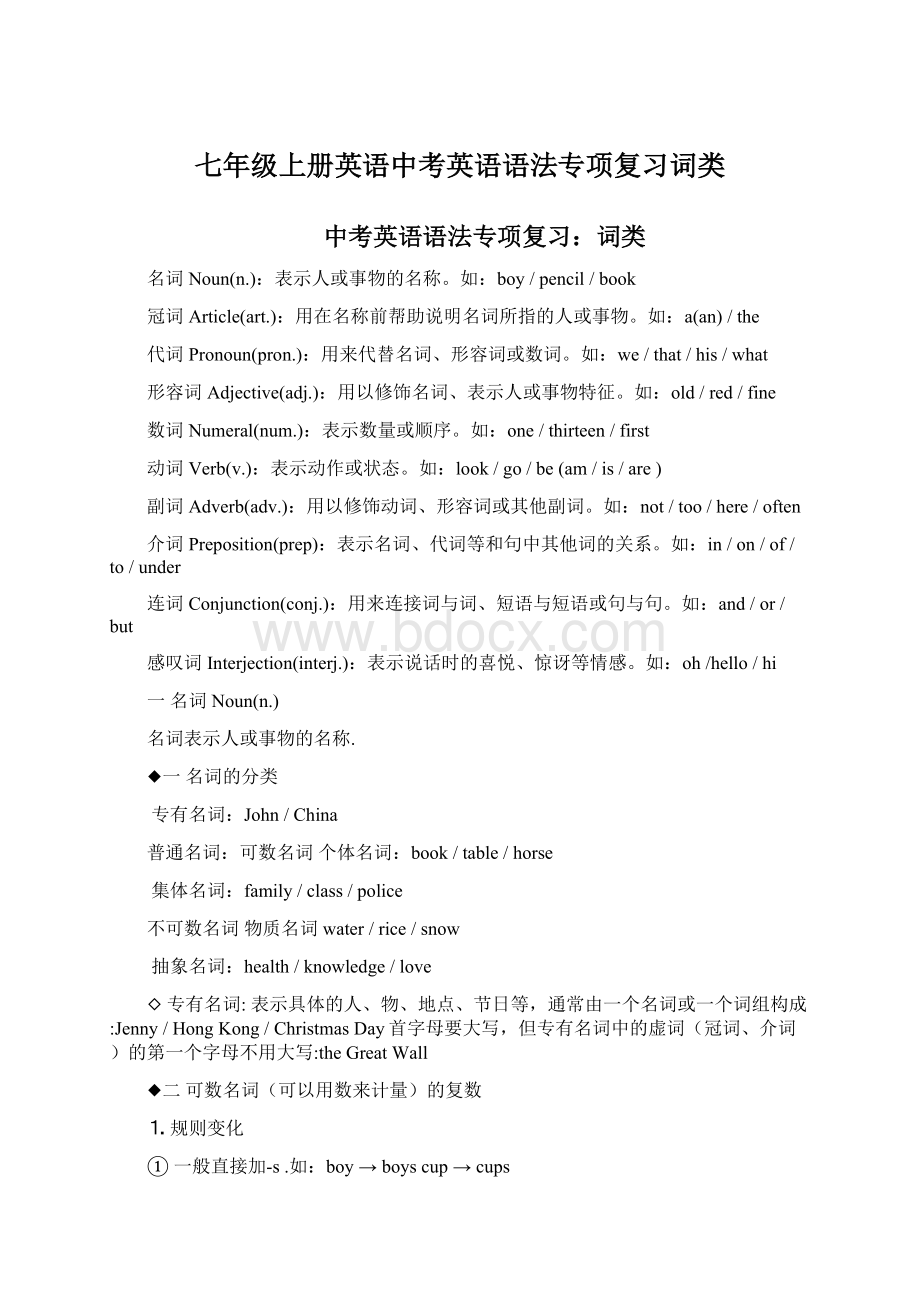七年级上册英语中考英语语法专项复习词类.docx
《七年级上册英语中考英语语法专项复习词类.docx》由会员分享,可在线阅读,更多相关《七年级上册英语中考英语语法专项复习词类.docx(44页珍藏版)》请在冰豆网上搜索。

七年级上册英语中考英语语法专项复习词类
中考英语语法专项复习:
词类
名词Noun(n.):
表示人或事物的名称。
如:
boy/pencil/book
冠词Article(art.):
用在名称前帮助说明名词所指的人或事物。
如:
a(an)/the
代词Pronoun(pron.):
用来代替名词、形容词或数词。
如:
we/that/his/what
形容词Adjective(adj.):
用以修饰名词、表示人或事物特征。
如:
old/red/fine
数词Numeral(num.):
表示数量或顺序。
如:
one/thirteen/first
动词Verb(v.):
表示动作或状态。
如:
look/go/be(am/is/are)
副词Adverb(adv.):
用以修饰动词、形容词或其他副词。
如:
not/too/here/often
介词Preposition(prep):
表示名词、代词等和句中其他词的关系。
如:
in/on/of/to/under
连词Conjunction(conj.):
用来连接词与词、短语与短语或句与句。
如:
and/or/but
感叹词Interjection(interj.):
表示说话时的喜悦、惊讶等情感。
如:
oh/hello/hi
一名词Noun(n.)
名词表示人或事物的名称.
◆一名词的分类
专有名词:
John/China
普通名词:
可数名词个体名词:
book/table/horse
集体名词:
family/class/police
不可数名词物质名词water/rice/snow
抽象名词:
health/knowledge/love
◇专有名词:
表示具体的人、物、地点、节日等,通常由一个名词或一个词组构成:
Jenny/HongKong/ChristmasDay首字母要大写,但专有名词中的虚词(冠词、介词)的第一个字母不用大写:
theGreatWall
◆二可数名词(可以用数来计量)的复数
⒈规则变化
①一般直接加-s.如:
boy→boyscup→cups
②以-s,-x,-ch,-sh,结尾加-es,如:
watch→watchesbox→boxes
③以“辅音字母+y”结尾变y为i再加-es.如:
story→storiesbaby→babies
④以f,fe结尾变f,fe为ves.如:
knife→kniveswife→wivesthief→thieves
leaf→leavesscarf→scarveslife→liveshalf→halves﹡roof→roofs
⑤以o结尾加-s如:
radio→radiosphoto→photospiano→pianos
zoo→zoos
加-es如:
hero→heroespotato→potatoestomato→tomatoes
英雄喜欢吃土豆和西红柿。
⒉不规则变化
①单复数同形:
sheep→sheepfish→fishChinese→ChineseJapanese→Japanesedeer→deeryuan→yuan※dollar→dollars
②只有复数形式:
clothesglasseschopsticksgoodstrouserspantsshorts
③特殊变化:
child→childrenfoot→feettooth→teethmouse→mice
man→menwoman→women※toothbrush→toothbrushes
④复合名词的复数形式:
a.当有man和woman时,前后两部分都变成复数形式amandoctor→twomendoctors
awomanteacher→threewomenteachers
b.其他只变最后一个名词为复数形式anappletree→lotsofappletreesbeefandtomatonoodles
◆三不可数名词(不可以用数来计量)的计量
⒈可数名词表示具体的数量,可以直接用数词来修饰:
twoapplestenpersons
⒉不可数名词必须与表示数量的名词连用,构成:
数词+量词+of+不可数名词
apieceofbreadtwocupsofcoffeethreeglassesofmilkfourboxesofchalkfivebagsofricesixdropsofwatersevenpiecesofnewseightpairsofglasses
◆四名词所有格:
表示名词之间的所有关系,连接两个名词
两种形式:
’s所有格→BeijingisChina’scapital.
of所有格→BeijingisthecapitalofChina.
⒈有生命名词所有格:
一般加-’s.Tom’sdeskChildren’sDay
以s结尾的复数名词只加’teachers’officestudents’books
※如果一样东西为两人共同所有,则在最后一个名词上加-’s(共有)ThisisMaryandLily’sroom./HeisTomandTim’sfather.
如果表示各自所有,则两个名词词尾分别加-’s(分别有)TheseareMary’sandLily’srooms./TheseareTom’sandTim’sbooks.
⒉无生命名词所有格:
名词+of+名词themapofChina/thedooroftheroom
※双重所有格
of+名词所有格:
Heisfriendofmybrother’s.
of+名词性物主代词:
Thisisabookofmine.
◆五可数名词与不可数名词的修饰词
修饰可数名词:
many/afew/few(Therearemanytrees.)
修饰不可数名词:
much/alittle/little(Wehavemuchhomeworktodo.)
共有的:
some/any/alotof/lotsof/plentyof
提问:
可数名词→Howmanybananasdoyouneed?
不可数名词→Howmuchyogurtdoyouneed?
※不可数名词没有复数形式,不能用a,an修饰,也不能用many,few,several等修饰。
不可数名词作主语,谓语用单数。
如:
Thehoneyisverysweet.
※有些名词需要用复数形式作定语。
aclothesshopsportsmeetingglassesstore
◇名词的句法功能
作主语:
Mathismyfavoritesubject.
作宾语:
Iboughtacomputerlastyear.
作表语:
Heisacleverstudent.
作宾补:
WecallhimUncleWang.
作定语:
There’resomeappletreesoverthere.
作状语:
Igotoschooleveryday.
作呼语:
Hello,boysandgirls.
练习
一.用所给词的正确形式填空。
1.Wewanttogotothe__________(greatwall).
2.Howmany________(chicken)arethereunderthetree?
3.Helikes________(chicken)verymuch,It’sverynice.
4.Therearetwo________(mouse)inthecage.
5.Thedoctorsavedtheir________(life).
6.Thechildhastwo________(tooth).
7.Ihavesomegood_______(news)foryou.
8.Thereisagroupof_______(fish)inthewater.
9.Theseare_________(German).
10.Shehasmany__________(girlfriend).
11.Wewanttohavesome__________(manteacher)inourschool.
12.Pleasegivemesome_________(advice).
13.Ihavealotof________(money).
14.Wewanttwo______(cup)of______(tea).
15.Theseare________(children)clothes.
16.Thisroomis______________(mybrotherandI).
17.Thesebooksare______________(Kateandhersister).
18.IhaveacoldIhavetogotothe_________(doctor).
19.IsthisTom’scoator_________(Bob)?
20.Therewillbea________(sport)meetingnextweek.
21.Thereissome________(meat)onthetable.
22.Todayis_________ (woman)Day.
23.Therearemany_________(visit)tocometomyhometowneveryyear.
24.Wewanttodosome________(shop)onSunday.
25.Walkingisgoodforour_________(healthy).
26.Heisafamous_________(music).
27.Theboyisin________(dangerous).
28.Youcanseemany_________(leaf)onthegroundinautumn.
29.Whoisthe__________(win)ofthegame.
30.Thereare_________(hundred)ofpeoplethere.
二.单项选择
1.Sheep_____whiteandmilk_____alsowhite.
A.is;areB.are;sC.are;are
2.Howwonderful!
The_____ismadeof_____.
A.house;glassB.house;glassesC.houses;glass
3._____aremadeof_____.
A.Glass;glassesB.Glasses;glassesC.Glasses;glass
4._____roomisnexttotheirparents’.
A.KateandJoanB.Kate’sandJoan’sC.KateandJoan’s
5.Therearefew_____inthefridge,Let’sgoandbuysomepeas,carrotsandcabbages.
A.vegetablesB.meatC.fruit
6.YangpuBridgeisoneof_____intheworld.
A.thebiggestbridgeB.thebiggestbridgesC.biggerbridges
7.Look!
Therearesome_____onthefloor.
A.waterB.childC.boxes
8.I’mhungry,Pleasegiveme_____.
A.apieceofbreadB.twopiecesofbreadsC.somebreads
9.Jackboughta_____inashoeshopyesterday.
A.pairofshoesB.pairsofshoesC.pairofshoe
10.Imeetsome_____intheparkandtalkedwiththemtheotherday.
A.JapanesesB.AmericansC.Chineses
11.Ihavethreepenpal,Oneis_____,theothertwoare_____.
A.Japanese;AmericaB.Canada;AmericaC.English;Frenchmen
12.BothTomandJimare_____.
A.menteachersB.menteacherC.manteachers
13.Hespent_____doingthewholething.
A.oneandtwodaysB.oneortwodaysC.onedayandtwo
14._____liveat78FenghuangStreet.
A.WhiteB.TheWhitesC.TheWhite
15.Pleasepassme_____.
A.twopieceofpaperB.twopiecesofpaperC.twopiecesofpapers
16.Inautumn_____turnyellow.
A.leafandgrassB.leavesandgrassesC.leavesandgrass
17.Some_____cametoourschoolforavisitthatday.
A.GermansB.GermenC.Germany
18.Youngpeopleshouldmake_____foroldpeopleonthebus.
A.roomB.roomsC.theroom
19.Thefootballunderthebedis_____.
A.LilyandLucyB.LilyandLucy’sC.Lily’sandLucy’s
20.Yourshoesarewornout,You’dbetterbuyanew_____.
A.newB.pairC.shoes
21.I’mnotfeelingwellnow,I’vehad_____.
A.coldB.aheadacheC.theheadache
22.You’dbetterdomorning_____everyday,It’sgoodtohavelotsof_____.
A.exercise;exerciseB.exercises;exerciseC.exercises;exercises
23.Morethan_____livedtheretwo_____ago.
A.hundredofpeople;hundredsyears
B.hundredsofpeople;hundredyears
C.hundredsofpeople;hundredsyears
24.Tom’shandwritingisbetterthananyother_____inhisclass.
A.studentsB.student’sC.students’
25.Thehospitalisabitfarfromhere,It’sabout_____.
A.fortyminutes’walkB.fortyminuteswalk
C.fortyminute’swalk
26.Howmucharethe_____?
A.meatB.appleC.apples
27.Jimwenttoa_____tobuyapairofshoes.
A.shoesstoresB.shoesstoreC.shoestore
28.Thisisnotmybook,butmy_____.
A.brother’sB.brotherC.brothers’
29.Weneedtwoteaspoonof_____.
A.honeysB.yogurtC.milks
30.It’sabout_____walkfrommyhousetoschool.
A.tenminutesB.tenminutes’C.tenminute’s
31.Theoldmanislonely,Hemadea______bysellingnewspapers.
A.livingB.lifeC.live
32.Canyougiveme_____onhowtolearnEnglishwell?
A.agoodadviceB.someadviceC.anyadvices
33.Take_____!
Thecarnearlyhityou.
A.carefulB.careC.carefully
34.September10this______inChina.
A.Teacher’sDayB.Teachers’DayC.TeachersDay
35.I’dliketodrink_____.
A.beersB.somewineC.sugar
二冠词Article(art.)
冠词是一种虚词,放于名词前,帮助说明名词的含义。
冠词不能单独使用,在句中不重读。
冠词分不定冠词a/an和定冠词the两种。
◆一不定冠词及用法
a/an是不定冠词,a用在以辅音开头的单词前:
aboyaroad
an用在以元音开头的单词前:
anhouranoldman
①泛指某一类的人或物。
如:
Apandaisverylovely.熊猫很可爱。
.
②第一次提到某人或某物时。
如:
Ihaveabook.我有一本书。
③表示一这个数量,没有one强烈。
如:
Ihaveamonth,anoseandtwoeyes.我有一张嘴、一个鼻子和两只眼睛。
④用于某些固定词组中。
如:
afew有一些/alittle一点儿/alotof许多/haveagoodtime玩得开心
◆二定冠词the的用法
①特指某人或某物。
如:
ThemaninthecarisMr.Smith.车里的人是史密斯先生。
②指谈话双方都知道的人或物。
如:
Openthedoor,please.请打开窗户。
③指上文已经提到过的人或物。
如:
Shehasason,thesonworksinBeijing.她有一个儿子,他在北京工作。
④用在世界上独一无二的事物前。
如:
Thesunisbiggerthantheearth.太阳比地球大。
⑤用在序数词和形容词最高级前。
如:
thefirstlesson第一课/thetallestgirl最高的女孩
⑥用在普通名词构成的专有名词前。
如:
theGreatWall长城/theYellowRiver黄河/theSummerPalace颐和园/theUnitedStates美国
⑦用在姓的复数形式前表示“一家人”。
如:
theSmithsaregoingtoQingdaoforavacation.史密斯一家打算去青岛度假。
⑧用于形容词前表示一类人或事物。
如:
therich有钱人/thepoor穷人/theold老年人/theyoung年轻人/theblind盲人
⑨用在乐器名词前。
如:
Canyouplaytheguitar?
你会弹吉他吗?
⑩用在一些习惯语中。
如:
inthemorning在上午/ontheleft在左边/bytheway顺便说一下/alltheyearround一整年/intheopenair在户外/atthesametime同时/allthetime一直/intheend最后;终于/thedayaftertomorrow后天/inthefuture在将来
◆三不用冠词的情况
在英语中,不用冠词的现象称作零冠词。
①如果名词前已经有指示代词(this/that/these/those)、形容词性物主代词(my/his/our…)或名词所有格等限定词,不用冠词。
如:
A.Thisismypen.这是我的笔。
B.Doyoulikethatcoat?
你喜欢那件外套吗?
C.TheseareRose’sbooks.这些事罗斯的书。
②表示语言、学科、三餐、球类运动、棋类运动的名词前,不用冠词。
如:
语言:
Chinese/English/French/Russian/Japanese…
学科:
maths/history/biology/geography…
三餐:
breakfast/lu